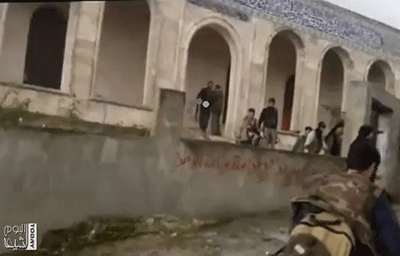HRW: Syria Rebels Attacking Religious Sites

Local Editor
New York-based advocacy group, Human Rights Watch, warned that Syrian rebel groups appeared to have destroyed or allowed the looting of minority religious sites in northern Syria.
 "The destruction of religious sites is furthering sectarian fears and compounding the tragedies of the country," said Sarah Leah Whitson, Middle East director at the New York-based HRW.
"The destruction of religious sites is furthering sectarian fears and compounding the tragedies of the country," said Sarah Leah Whitson, Middle East director at the New York-based HRW.
In the northern Idlib province, where rebels have taken swathes of territory from government forces, the New York-based rights group said opposition fighters destroyed a Shia "husseiniya" - a site for worship and gatherings.
Human Rights Watch researchers indicated that the damage was deliberate. The husseiniya windows were broken, prayer stones littered the floor, two of the interior walls were blackened from flames, and a religious poster had been torn off of the wall, with remnants of the poster left behind.
Human Rights Watch researchers also saw remnants of burned posters and papers, and what appeared to be the remnants of a burned prayer rug in the building. Burned items were lying together on the floor, appearing to indicate they were piled on top of one another and deliberately set on fire.
A video published online showed rebels hoisting assault rifles in the air and cheering as the site in the village of Zarzour, taken by rebels in December, burned in the background.
"Indiscipline and looting by rebels in some areas has also undermined civilian support for their cause, especially among minority groups," the group said, and warned that "the opposition also has failed to rein in gunmen engaging in looting and other criminal activities, like kidnappings."
In the western Latakia province, Human Rights Watch quoted residents as saying gunmen working "in the name of the opposition" had broken into and stolen from Christian churches in two villages.
A resident in Jdeideh, one of the villages, reported that gunmen had broken into the local church, stolen and fired shots inside, after government troops had left the area, the rights group said.
"While the motivation for the church break-ins may have been theft rather than a religious attack, opposition fighters have a responsibility to protect religious sites in areas under their control from willful damage and theft," Human Rights Watch said.
Moreover, residents told Human Rights Watch that armed opposition gunmen looted some homes after taking control of the town and kidnapped two local villagers in Ghasaniyeh and Jdeideh
In parallel, the international watch dog cautioned that "Syria will lose its rich cultural and religious diversity if armed groups do not respect places of worship. Leaders on both sides should send a message that those who attack these sites will be held accountable."
Meanwhile, the UN Food and Agriculture Organization in a statement on Wednesday the livelihoods of about half of the country's population were threatened as a result of the Syrian crisis.
The UN says that about 80 percent of 10 million Syrians -- about 46 percent of the population -- derive their livelihoods from agriculture.
"Twenty-two months of conflict has left Syria's agricultural sector in tatters with cereal, fruit and vegetable production dropping for some by half and massive destruction of irrigation and other infrastructure," the statement said.
"Destruction of infrastructure in all sectors is massive," said Dominique Burgeon, FAO's Emergency and Rehabilitation Division director after a five-day visit to both regime- and rebel-controlled areas.
The FAO said wheat and barley production was halved last year, going from 4 to 4.5 million tonnes in normal years to less than 2 million tonnes.
"Only 45 percent of the farmers were able to fully harvest their cereal crops while 14 percent reported they could not harvest due to insecurity and lack of fuel," the FAO said.
It highlighted a lack of irrigation because of damage to irrigation canals and a lack of fuel, while the movement of livestock to grazing areas was thwarted.
Source: News Agencies, Edited by moqawama.org




